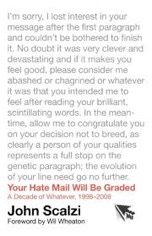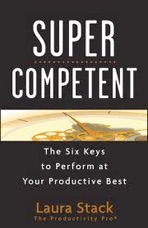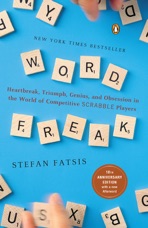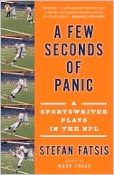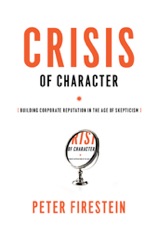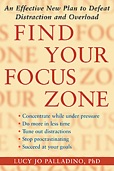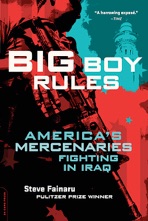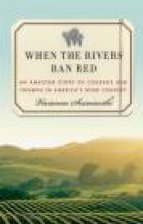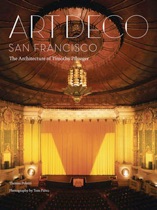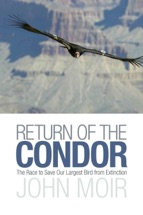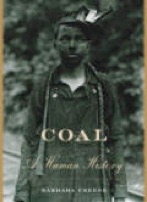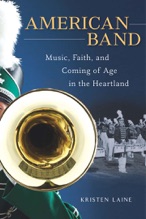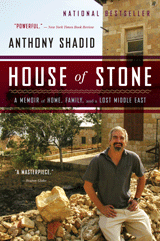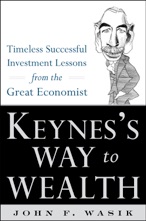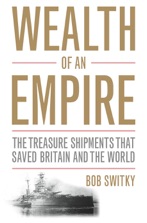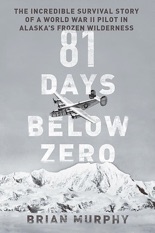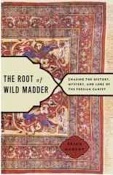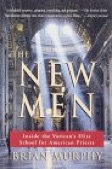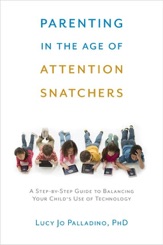A sampling of
Authors & titles
A sampling of
Authors & titles
81 Days Below Zero
The incredible survival story of a World War II pilot in Alaska’s frozen wilderness
by Brian Murphy
with Toula Vlahou
In June 1942, Japanese forces raided the U.S. naval base at Dutch Harbor in the Aleutian Islands. Alerted to the threat of a North American invasion through Alaska, the U.S. military scrambled to build its defenses on North America’s western frontier. The effort was well under way on a December morning in 1943, when an Army Air Forces B-24 Liberator, newly improved to withstand the severe Alaskan weather, took off on a training mission from Fairbanks’s Ladd Field. It never returned, having crashed in a frozen wilderness. Only one man survived: Lt. Leon Crane, who was able to parachute from the plane at the last minute. A city boy from Philadelphia and a trained engineer, Crane had practically nothing with him save his parachute, some matches, and a Boy Scout knife. With the B-24 in its final death spiral, Crane hadn’t even had time to pull on his gloves. And yet, for the next 81 days, Crane managed to stay alive in subzero temperatures and whiteout conditions, hiking through an unforgiving wilderness along the Charley River until, nearly starved and dying from the cold, he finally found a remote fishing shack and his own salvation. Now Crane’s dramatic story, previously untold save for a few magazine stories and a mention in John McPhee’s 1977 Coming into the Country, will finally reach readers. Like Into the Wild, it is the true story of one man’s struggle with nature. But unlike the protagonist of that book, Crane had no illusions about the danger surrounding him, using his wits to make an accommodation with nature that saved his life. In the hands of veteran author and Washington Post foreign correspondent Brian Murphy, who has reported from all over the world, Leon Crane’s immense character and quiet determination come alive, as does the harsh yet beautiful setting for his ordeal. Da Capo Press, 2015. ISBN 978-0-82328-2.
Also by Brian Murphy on the Agency’s list:
The Root of Wild Madder
Chasing the history, mystery, and lore
of the Persian carpet
Every Persian carpet has a story to tell, and the intricate weaves of these elegant works tell us a great deal about the people who made them. Persian rugs, Brian Murphy shows, carry with them centuries of stories, the dreams and aspirations of families, and even, according to some, the souls of those who once owned them. They signify the human search for a perfection we can never quite achieve. In The Root of Wild Madder, Brian Murphy introduces us to the weavers (often girls, who create some of the carpets for their dowries), the "mules" who move them from place to place, the tradesmen who sell them in the bazaars of Tehran and Isfahan, and the poets who write about them. He shows us how to look at carpets in a new way, understanding not only how we value these works of art but the stories their creators wanted us to know. Brian Murphy is a staff writer for the Washington Post and previously reported for the AP from more than 50 countries around the world. On the Agency’s list, he is also the author of The New Men. Simon & Schuster. ISBN 978-0-7432-6421-1.
The New Men
Inside the Vatican’s elite school for American priests
In this fascinating and moving window into a little-seen world, Brian Murphy introduces us to six American seminarians as they enter the Vatican’s “West Point for priests”--the North American College in Rome. Here, these men with very different backgrounds and outlooks struggle to leave a world in which they were great successes for a life of service, celibacy, and self-denial. We meet a former top-gun Air Force pilot, a high-living New Orleans lawyer, a pair of brilliant twins from the top of their class at Harvard, a farm boy from North Dakota, and a Vietnamese refugee whose family survived the fall of Saigon--all drawn, despite their innermost doubts, to prayer, meditation, and a new spiritual path. Riverhead. ISBN 978-1-5732-2699-8.

Parenting in the Age of Attention Snatchers
A step-by-step guide to balancing your child’s use of technology
by Lucy Jo Palladino, Ph.D.
Children spend more and more of their time on smart phones and tablets, using apps specially engineered to capture their attention. And parents are worried. They want their children get the most out of technology without the downside: attention difficulties that could stay with them for the rest of their lives, to say nothing of a withdrawal from “live” engagement with friends, family, and the world around them. How do we pull kids away from their screens at the dinner table? How do we know whether restricting their technology time will actually hurt their schoolwork instead of helping them stay more focused? And how can parents avoid the guilt that comes from allowing gadgets to occupy their kids' time when Mom and Dad have to get other tasks accomplished? The key, as attention expert and celebrated author Lucy Jo Palladino, Ph.D. shows in this insightful and understanding book, is to help kids cultivate their voluntary or "top-down" attention so they'll be able to stay focused and engaged for the rest of their lives. In seven straightforward steps, parents will learn how to help their kids embrace technology in just the right measure—and how to teach them to say no at just the right times. A psychologist practicing in Southern California, Lucy Jo Palladino is also the author of The Edison Trait (Ballantine) and Find Your Focus Zone (Free Press). Roost Books/Shambhala, 2015. ISBN 978-1-61180-217-7. Visit the author’s website at www.lucyjopalladino.com.
Also by Lucy Jo Palladino, Ph.D. on the Agency’s list:
Find Your Focus Zone
Find Your Focus Zone is for and about the millions of people--just about all of us--who must fight to pay attention in a world full of distractions, from digital gadgets and Twitter feeds to the usual background noise in our homes and offices. Lucy Jo Palladino distills the latest research and makes the best new psychological tools accessible to everyone. She provides eight "keychains" that will help you find your personal focus zone by developing new emotional, mental, and behavior skills--plus the three keys that will help you unlock your potential in each of these areas. Imagine feeling confident that when co-workers interrupt your work, ads pop-up on your computer screen, and impulses jump into your brain, you'll still stay focused and get your work done on time. Find Your Focus Zone will help you beat procrastination and tackle even boring jobs; overcome obstacles and finish what you start; prevent overwhelm and burnout; build trust in your close relationships; boost your self-confidence; and increase your efficiency and effectiveness--all by paying better attention Envision taking charge of the way others see you, because you have more awareness of how you look to them! Atria Books/Simon & Schuster. ISBN 978-1-4165-3201-3.

The Thinking Person’s Guide to Climate Change
by Robert Henson
This exhaustive yet thoroughly readable book provides a complete and unbiased guide to one of the most pressing problems we face--climate change. From the current situation and background science to possible solutions, Robert Henson covers the whole subject, including visible symptoms of climate change, what computer simulations reveal about our past, present, and future climates, what the skeptics say and their grounds for disagreeing with the scientific majority, and that most basic subject of all: how global warming really works. The Thinking Person’s Guide not only reviews the last several decades of media coverage of this complex set of issues, separating fact from fiction, but also describes what governments and scientists are doing to try and solve the problem. It includes advice for consumers who want to reduce their own carbon footprint, and comes complete with a glossary of websites for further information. Some of the material in this brand-new edition appeared originally in The Rough Guide to Climate Change, Robert Henson’s worldwide bestselling guide, which was published in three editions and shortlisted for the prestigious Royal Society Prize for Science Books. Now completely updated with the latest research, and heavily illustrated, The Thinking Person’s Guide to Climate Change is the most thorough and accessible book about an issue of critical importance to all of us. Robert Henson, a meteorologist by training, is a weather and science blogger at Weather Underground. He was previously an editor at the University Corporation for Atmospheric Research in Boulder, Colorado, one of the world's premier centers of weather research. He is also the author of Weather on the Air: A History of Broadcast Meteorology. American Meteorological Society Press, 2014. ISBN 978-1-93570-473-7.

House of Stone
A memoir of home, family, and a lost Middle East
by Anthony Shadid
The National Book Award and National Book Critics Circle Award finalist and New York Times bestseller.
“A masterpiece.”
— John Freeman, Boston Globe
A lasting tribute to one of the greatest reporters of his generation.
Anthony Shadid earned his place as one of the most distinguished American journalists of his generation, a humane and clearheaded interpreter of the sea-change overtaking the contemporary Middle East. The two-time Pulitzer Prize winner’s final work, House of Stone, was a 2012 National Book Award finalist, published just weeks after the author’s tragic death while reporting from Syria. It blends reportage with a deeply personal narrative about the vagaries of identity and family, war and peace, loss and redemption. Shadid’s narrative centers on Marjayoun, the market town in southern Lebanon from which his ancestors emigrated to Oklahoma three generations ago. There, he settled into the home of his great-grandfather Isber Samara to recuperate from years of reporting from the front lines, lovingly rebuilding the home and reclaiming his heritage and his bearings. In the beautiful early-20th century house, he could also reclaim a measure of the lost era scholars call the “Levant,” a place of grace, grandeur, and lost civility. It was not only a physical restoration but a metaphorical one, as the spirit of Isber, a self-made optimist, returned to the arched hallways that had been damaged by years of warfare and neglect: the restoration of a structure, of a family’s presence, and of Shadid’s own identity as an American of proud Lebanese descent. In this extraordinarily beautiful and timely work, Anthony Shadid juxtaposes past and present to tell the story of the contemporary Middle East, refracted through the lens of one town, one family, and one house—and the larger story of the dreams immigrants have always brought to the shores of North America. Houghton Mifflin Harcourt. ISBN 978-0-544-00219-7.
Also by Anthony Shadid on the Agency’s List:
Night Draws Near
Iraq’s people in the shadow of America’s war
In this searing and honest work, Shadid brought life to the stories of ordinary Iraqis forced to cope with or succumb to dictatorship, war, and an uncertain future. From Karima, a widowed mother of eight sending her last son off to battle to Amal, her 14-year-old daughter, whose tattered diary is perhaps as powerful and poignant as Anne Frank’s, the book’s vivid characters humanized a city and a people known to Americans only in caricature, as well as capturing the ambiguities of the Iraq war. Honest, powerful, at times personal and always emotionally engaged, Night Draws Near is one of the definitive works to have emerged from the collision between America and Iraq. Originally published 2005. Picador. ISBN 978-0-312-42603-3.
Legacy of the Prophet
Despots, democrats, and the new politics of Islam
Originally published in 2001 and reissued the following year, Legacy of the Prophet surveys the evolving role of Islam in reshaping the political landscape of the Middle East. In retrospect, many of its predictions, including the fall of the Mubarak regime and rise of the Muslim Brotherhood in Egypt, were prescient. Still relevant to understanding the texture of governance and current affairs in the region, the book examined the sweep of religion and politics from Sudan to North Africa to Iran. Basic Books/Westview. ISBN 978-0-813-34018-0.

Wine & War
The French, the Nazis, and the battle for France’s greatest treasure
by Don and Petie Kladstrup
A classic work of popular history, Wine & War is tailor-made for at least three different audiences: those interested in World War II, in France and in wine. It went straight to national bestseller lists when it was first published in 2001 and now has more than 170,000 copies in print in 16 printings; it has been published in 10 countries. This is the "home front" story of French winemakers as they struggled to keep their business, and the heritage it represented, alive during their country's occupation. As France surrendered in 1940, the nation's winemakers scrambled to save their vineyards, wineries, and most distinguished wines, resorting to tactics Janet Flanner once aptly called "hiding, fibbing, and fobbing off." For this gripping narrative, the Kladstrups interviewed surviving vignerons and their children, as well as the children of German officers, learning how Paris restaurateurs hid priceless wines behind hastily constructed walls (covered with dust and cobwebs to look old), winemakers hid Jewish neighbors, refugees, and partisans, and German officials appointed to oversee the industry in some cases colluded with the French to save the business. There were traitors, too, collaborators with the Nazis who paid with their lives and reputations after the war. Wine & War has also been published in the UK, France, Germany, Brazil, Japan, the Netherlands, South Korea, Spain, and Sweden and has been optioned for a feature film. Don Kladstrup, one of America's most distinguished news correspondents, reported for ABC News and, previously, CBS News, winning three Emmy Awards, the du Pont Columbia Award, and many others. He and his wife, the award-winning journalist Petie Kladstrup, divide their time between Normandy and Paris. Crown/Broadway. ISBN 978-0-767-90448-3.
Also by Don and Petie Kladstrup on the Agency’s list:
Champagne
How the world’s most glamorous wine triumphed over war and hard times
Named a New York Times "Editors' Choice," Champagne tells the enthralling history of a wine we associate with life’s happiest occasions and a region that has known countless cycles of war, revolution, and rebirth. Rightly or wrongly attributed to the monk Dom Perignon, Champagne has continued to thrive even in an era of competition from abroad and ever-changing drinking habits. Indeed, the region and its wine have always had to work hard for their success. The First World War virtually destroyed the region's wine center, Reims, literally driving most of the city’s population underground to live in the very caves where champagne has been aging for centuries. And yet, they carried on. This celebrated wine's extraordinary history more than fills the pages of this justly praised book, which has been published in many countries. Harper Perennial. ISBN 978-0-060-73793-1.

Word Freak
Heartbreak, triumph, genius, and obsession in the world of competitive Scrabble players
by Stefan Fatsis
"Funny, thoughtful, character-rich, unchallengeably winning writing.”
—The Atlantic Monthly
A New York Times bestseller
In this classic national bestseller, author, Slate columnist, and NPR sports commentator Stefan Fatsis recounts his remarkable rise through the ranks of elite Scrabble players while exploring the game's strange, potent hold over them--and him. The most talented players of this classic game, a fixture in more than 30 million American homes, inhabit a sphere far removed from the masses of "living room players." Theirs is a surprisingly diverse subculture that is often funny but at other times quite dark and even addictive. In the course of this brilliant narrative, Fatsis is transformed from a journalist on the outside, looking in, to one of the denizens of this strange world--someone who memorizes thousands of obscure words and fills his evenings with solo Scrabble played on his living room floor so he can begin to compete with the world's best players at tournaments. Besides Word Freak, Fatsis is the author of Wild and Outside: How a Renegade Minor League Revived the Spirit of Baseball in America's Heartland (Walker, 1995) and A Few Seconds of Panic: A Sportswriter Plays in the NFL (Penguin Press, 2009). Penguin PB. ISBN 978-0-14-200226-1. Now in e-book formats from Houghton Mifflin Harcourt. Stefan tweets @stefanfatsis.
Also by Stefan Fatsis on the Agency’s list:
A Few Seconds of Panic
A sportswriter plays in the NFL
In A Few Seconds of Panic, Stefan Fatsis puts his mind and body to an incredible test: training with the NFL Denver Broncos to become a pro-grade kicker. He's unlike his teammates in some ways, but remarkably like them when he risks crippling injury, enduring the hazing that befalls all rookies, and slogging through twice-daily practices in blistering heat. And he begins to think like one of them, as well. Along the way, he finds out about a remarkable community of players who are visible yet largely unknown to most fans: the kickers who enter the gridiron to do one thing and must do it perfectly every single time. Not since George Plimpton's Paper Lion, more than 40 years ago, has an author so revealingly chronicled life in the NFL, a league much transformed in the decades since that classic book. With wry candor and hard-won empathy, A Few Seconds of Panic reveals the mindset of the modern pro athlete and the workings of a storied sports franchise. In addition to Word Freak, he is previously the author of Wild and Outside on the Agency’s list. Penguin. ISBN 978-0-14-311547-2.

How Not to Kill Your Baby
A slightly useless guide
by Jacob Sager Weinstein
From the moment they first learn the good news, parents-to-be are subjected to an endless barrage of panicked and frequently contradictory advice. Pregnant women must never eat fish (too much mercury). No--they must eat more fish (all those great omega 3 fatty acids!). Once the baby is born, it only gets worse. There are books that warn of horrible dangers if parents don’t keep their kids under lock and key, and books that warn of horrible dangers if they don’t give their kids enough freedom. There are books that warn of disaster if they don’t heed the latest science, and books that warn of disaster if they don’t cling to all the old traditional ways. How Not to Kill Your Baby is the book they really need: a hilarious parody of every crazy-making news article and parenting book you’ve ever cringed over. From writing a birth announcement that won’t attract the attention of kidnappers to doing criminal background checks on other parents before scheduling a playdate, you’ll learn everything you need to know about being a good parent—and then some! Andrews McMeel Publishing. ISBN 978-1-4494-0991-3. Jacob tweets @jacobsw.

The Good Doctor
A father, a son, and the evolution of medical ethics
by Barron H. Lerner
In this fascinating and deeply personal work, author, internist, and medical ethicist Barron Lerner examines the profound changes American medicine has undergone in recent generations. He tells this story through a unique lens: that of two doctors, the author and his father, distinguished physicians who approached the doctor-patient relationship in profoundly different ways. The first Dr. Lerner, Phillip, was a revered clinician fiercely devoted to “patient-centered” medicine but willing to make the kinds of life-or-death decisions that physicians of our own era would avoid. The second, the author himself, embraced a revolution in medical ethics that emphasized patients’ rights and rejected the paternalistic approach that was ordinary--and even lauded--when his father graduated from medical school. This difference of approaches was thrown into great relief as Barron faced his father’s final illness from Parkinson’s disease, and found himself confronted with the dualism of being both son and physician. This story of one family’s engagement with medicine could hardly be more relevant, as the nation confronts not only the spiraling cost of healthcare but the struggles of caring for an increasingly aging population. It is also a wonderful memoir of an American family. Barron Lerner is an internist on the medical faculty at New York University. He is a leading medical ethicist and historian and a frequent contributor to The New York Times Science Times section, Huffington Post, and other media. His previous works include The Breast Cancer Wars and One for the Road. Beacon Press. ISBN 978-08070-3504-7.
Also by Barron H. Lerner on the Agency’s List:
When Illness Goes Public
Celebrity patients and how we look at medicine
by Barron H. Lerner
Steve McQueen's high profile cancer battle and sad end changed the way the public perceived a dreaded disease and its treatment, and is just one of the stories of celebrity illness that Barron H. Lerner, M.D. examines in When Illness Goes Public, his first book since the celebrated The Breast Cancer Wars. Lerner describes the evolution of celebrities' illnesses from private matters to stories of great public interest, tracing the rise of patient activism in line with an evolution in the way the media have covered sickness and treatment over the past 70 years. Marrying great storytelling with an exploration of the intersection of science, journalism, fame, and legend, this book is a groundbreaking contribution to our understanding of health and illness. Barron H. Lerner is Professor of Medicine at New York University. He is a frequent contributor to The New York Times Science Times section. Johns Hopkins University Press. ISBN 978-08018-9227-1.

Wealth of an Empire
The treasure shipments that saved Britain and the world
by Robert Switky
Wealth of an Empire tells the dramatic, true story of the greatest treasure shipments in world history--a massive, top-secret operation that changed the course of World War II. As war loomed in Europe in 1939, the United States refused to sell Britain needed provisions on credit. Contrary to popular perceptions of U.S. amity toward Britain, America's refusal to sell arms and other goods without payment up-front gave the British government little choice but to move its entire treasury of gold and securities to North America--not only to keep it safe from the threatened German invasion but to buy desperately needed food, clothing, and provisions. Ultimately, more than 180 ships successfully delivered some 340 shipments of gold and security to New York, Halifax, and other ports along the Eastern Seaboard. A single convoy--the same one that famously transported King George VI and Queen Elizabeth on a goodwill trip to North America in 1939--carried $151 million (the equivalent of $2.3 billion in today’s dollars). The book details the enormity of the two-year effort, the intensive secrecy of the operation and the consequences of failure. Had the gold- and securities-laden ships been sunk or captured by the Germans, the war could have been lost more than a year and a half before the Japanese attack on Pearl Harbor. Yet only one ship was sunk--and even then, its gold was recovered and brought to safety in North America. Britain kept its economy alive and its war effort strong until the United States entered the war for good in 1941. Amazingly, no book has explored this monumental story in more than three decades, and most books about World War II have ignored the treasure shipments completely. Now Robert Switky, a professor of political science at California’s Sonoma State University, brings this extraordinary historic episode to life, in an exciting narrative that fills a void in our understanding of the early years of the war. Potomac Books/University of Nebraska Press. ISBN 978-1-612-34496-6.

Keynes’s Way to Wealth
Timeless successful investment lessons from the great economist
by John F. Wasik
John Maynard Keynes was one of the most influential economists of the 20th Century, and one whose legacy is once again shaping how policymakers view the global economy and markets. But few students of Keynes know that he was also a daring, steel-nerved investor who built a multi-million-dollar fortune while acting as a virtually unpaid counselor to world leaders like Winston Churchill and Franklin Delano Roosevelt. Since he traveled in many circles--as an economist, art-lover, expert on the writings of Isaac Newton, and public intellectual--he applied many different bodies of learning to his work, and his influence was vast. He also knew the way markets really worked and gleaned key insights that not only enriched him but those he advised. Now, veteran financial writer and longtime Agency author John F. Wasik distills those insights for all investors, not only explaining Keynes’s techniques but showing readers how he timed his investments and how keeping a rational attitude kept him on course. It’s timeless advice from one of the great economic minds of all time. John Wasik is the author of 14 books, nine of them on the Agency’s list, most recently including The Cul-de-Sac Syndrome (about the 2008 housing crisis and its potentially lasting effects) and the Audacity of Help, about the Obama administration’s original economic program. A veteran columnist, he has won 18 major prizes for his work as an investigative reporter. McGraw-Hill. ISBN 978-0-071-81547-5.
Also by John F. Wasik on the Agency’s List:
The Merchant of Power
Samuel Insull is one of the most fascinating characters in American business history, an English waif who talked his way across the Atlantic and into a job with his boyhood idol, Thomas Edison. In The Merchant of Power, John F. Wasik tells the rags-to-riches-to-rags story of this brilliant, largely misunderstood business leader. It was Insull who consolidated Edison's companies into the giant General Electric Company. From his Chicago base, he later came to control a third of the nation's electric power. More than a tycoon, Insull believed in electricity's power to liberate the masses and set himself to revolutionizing the American city. But the Great Depression proved Insull's undoing, and he died penniless in a Paris exile after trying to make good on his debts. His remarkable rise and fall is the subject of this wonderful biography. Palgrave Macmillan. ISBN 978-0-230-60952-5.

The Foie Gras Wars
How a 5,000-year-old delicacy inspired
the world's fiercest food fight
by Mark Caro
A Gourmand Award and Great Lakes Book Award winner
"An admirably fair-minded yet always engaging account from the front lines of the Culture War. . . a must-have." --Anthony Bourdain, chef and author of Kitchen Confidential
In 2012, California’s banned foie gras, amid rejoicing from animal-rights activists and grief from traditionalist foodies. But the seeds of the anti-foie gras movement were planted years earlier, when celebrity chef Charlie Trotter stopped serving foie gras at his legendary Chicago restaurant and inadvertently triggered a controversy that engulfed chefs nationwide. The Foie Gras Wars pitted animal rights activists against farmers and politicians against food writers, triggering a battle of words, sabotage, and even death threats. And all because of a front page Chicago Tribune story by Mark Caro, which won a James Beard Foundation citation and led to Chicago's landmark, on-again/off-again foie gras ban--a trend that gained ground in cities and states across the country. In The Foie Gras Wars, Caro expands on this darkly comic news story to explore the larger issues it raises. What's the significance of banning a dish that relatively few people eat? Were foie gras ducks and geese being tortured, or weren't they? And what did the French artisans who still produce foie gras the traditional way have to say about the controversy playing out on our side of the Atlantic? The Foie Gras Wars is an entertaining story that shows us not only how we decide what to eat but why we so often look the other way when faced with inconvenient truths about our food. Simon & Schuster. ISBN: 978-1-4516-4086-1.
Your Hate Mail Will Be Graded
A decade of whatever, 1998-2008
by John Scalzi
Hugo Award winner
Since 1998, novelist John Scalzi's blog Whatever has been one of the Internet's most popular daily commentaries on contemporary life, politics, science fiction—even cats. John's always brilliantly drawn essays range from the witty "Unasked-for Advice to New Writers About Money" (essential reading for all aspiring authors) to the nuanced and heartbreaking "The Speckless Sky," written on September 12, 2001. Now, the first decade in the life of this always-wise, surprising, and popular (45,000 daily visitors) blog is at last available in one handy place, even if it is in the slightly older form of paper and binding! Your Hate Mail Will Be Graded won the 2009 Hugo Award for Best Related Work, and is now available in a new paperback edition. It includes a foreword by actor and popular blogger Wil Wheaton. John Scalzi is one of the bestselling science-fiction novelists in the United States -- and perhaps the universe -- and editions of his books have been published around the world. They include the celebrated Old Man's War series, three of whose four titles were also Hugo Award nominees. TOR Books. 978-0-7653-2711-6. Visit the author’s website at http://whatever.scalzi.com.
Big Boy Rules
America’s mercenaries fighting in Iraq
by Steve Fainaru
Pulitzer Prize winner for international reporting
Steve Fainaru's 2008 Pulitzer Prize was a landmark in an already-illustrious career as a journalist. So is Big Boy Rules, one of the definitive books to emerge from America's involvement in Iraq. Fainaru describes the dangerous, poignant, often insane and always fascinating lives of men who became known as "security contractors," Americans who traded the safety of home for the unpredictability of life in Iraq. No one knows exactly how many of these contractors were at work, but they were to become an alternative army, and they approached their work with different motivations: some for money, some to leave behind lives of failure and confusion, and some because they relished the excitement. Fainaru, then a reporter for the Washington Post, joined a group of contractors on the highways of Iraq as they went about their business--which frequently included standing in for our regular military in places the generals judged too dangerous for ordinary soldiers. Along the way, he found the humanity--and even the dark humor--of these least-described men on America's frontline in Iraq. Like Fight Club mixed with Band of Brothers, Big Boy Rules is a powerful, shocking, vivid, and sometimes strangely funny narrative about American men on the fringes of war -- and just plain on the fringes. In addition to the 2008 Pulitzer Prize for Investigative Reporting, Steve Fainaru is the winner of the Hal Boyle Award from the Overseas Press Club and currently reports for ESPN. Da Capo Press. ISBN 978-0-81838-7.
Supercompetent
The six keys to perform at your productive best
by Laura Stack
Even if the recession is behind us, the new corporate mantra is "buckle down." In this back-to-basics climate, quality again trumps quantity and doing a good job is paramount. That means being not just competent but supercompetent—able to survive and thrive in your work when all those around you are struggling. The good news, as Productivity Pro Laura Stack shows in Supercompetent, is that these qualities aren't in the genes, but something we can all learn. The key is mastering six traits: Connection, Decisiveness, Effort, Consistency, Productivity, and Personal Responsibility. When we do, we can move from the "zero thinking" of the average performer to the "hero thinking" of the supercompetent professional. As president of Denver-based The Productivity Pro, Inc., Laura Stack addresses major corporate and organizational audiences more than 120 days a year and is the current president of the National Speakers Association. She is also the author of Leave the Office Earlier, Find More Time, and The Exhaustion Cure (all from Broadway Books) and her newsletter is read by subscribers in 38 countries. John Wiley. ISBN 978-0-470-59915-0. Visit the author’s website at http://www.theproductivitypro.com.
Crisis of Character
Building corporate reputation in the age of skepticism
by Peter Firestein
Executives no longer operate with complete independence, instead running companies that must listen to many voices, from investors to NGOs to financial media, bloggers, their own employees, and a public hungry for clarity. This is today's expanded group of stakeholders--the influencers whose opinions can determine the destiny of any corporation. Wise executives and boards of directors will seize opportunities to make them partners and allies rather than critics and enemies. In Crisis of Character, Peter Firestein argues for listening to and learning from these influencers. His Seven Strategies of Reputation Leadership show executives, top managers, boards of directors, and consultants how to implement practices and shape beliefs that will earn their companies valid, valuable, and well-deserved reputations. A good reputation can't be built overnight or invented by marketing campaigns; it must be built over time and earned. This guide will help every company become more responsive to opportunities in its environment-- and, most important, to the best ideas within its ranks. Peter Firestein is CEO of New York-based Global Strategic Communications, Inc. and has been advising senior managers of corporations and government bodies, both in the U.S. and abroad, for two decades. A professional writer and editor as well as a business adviser, he also holds a degree in creative writing from Stanford University. Union Square Press. ISBN 978-1-4027-6246-8.
The Government Manual for New Pirates
by Matthew David Brozik
and Jacob Sager Weinstein
Here’s another cure for unemployment: Matthew David Brozik and Jacob Sager Weinstein have written three hilarious manuals in the Government Manuals series, all with tips for those considering a change to a slightly less conventional career. The Government Manual for New Pirates (like the Government Manual for New Superheroes and the Government Manual for New Wizards before it) supplies all the information the government might supply if it really furnished free consumer information on these subjects. Lest you be set upon by buccaneers even more dauntless than you are, this whimsical manual takes you on an ocean-by-ocean tour of all the pirate hotspots in the world. Along the way, you’ll learn everything you need to know about pirate fashion, choosing and naming your ship, dealing with denizens of the deep (from sharks to Godzilla), and even favorite (and not so favorite) pirate chanteys. Matthew David Brozik is an attorney and writer whose brilliant fiction has appeared in such publications as McSweeney's, Sycamore Review, Spout Magazine, Sidewalks, and Barbaric Yawp. A former standup comedian, he lives on Long Island. Jacob Sager Weinstein was an award-winning writer for HBO's "Dennis Miller Live" and a contributing editor to the Washingtonian magazine who recently made his first contribution to The New Yorker’s “Shouts and Murmurs” column. He lives in London. Andrews McMeel. ISBN 978-0-7407-6790-6.
Art Deco San Francisco
The Architecture of Timothy Pflueger
by Therese Poletti
An elegant homage to one of the West Coast's greatest 20th century architects, Art Deco San Francisco: The Architecture of Timothy Pflueger restores this major figure to his rightful place in architectural history. Timothy Pflueger (1894-1946) was a defining force in building modern San Francisco. His famous buildings include the palatial Castro Theater (1922) and many other major movie houses, and his skyscrapers are among the best known on the San Francisco skyline. It is a testament to Pflueger's versatility and genius that so many of his projects still exist. One need only drive over the San Francisco-Oakland Bay Bridge, America's busiest toll crossing, to understand Pflueger's indispensability. Some of his constructions are sadly lost, including the fantasia of the San Francisco World's Fair of 1939-40 and the St. Francis Hotel's Patent Leather Bar, but they survive in photographs by Ansel Adams, among others, that are featured in this lavish book, which is enhanced by Tom Paiva's magnificent photographs and many rare archival illustrations. Therese Poletti is an award-winning technology columnist for Marketwatch.com and previously wrote for the San Jose Mercury News. In her spare time, she gives architectural walking tours of San Francisco. She holds a master's degree from the Columbia University School of Journalism and lives in San Francisco. Princeton Architectural Press. ISBN 978-1-568-98756-9.
When the Rivers Ran Red
An amazing story of courage and triumph in America's wine country
by Vivienne Sosnowski
A San Francisco Chronicle Bestseller and Gourmand Award winner
Newspaper editor Vivienne Sosnowski was pursuing her avocation as a photographer when some of the most distinguished winemakers of California's Sonoma County, many of them in their 90s, began describing their families' struggles during Prohibition. The time had come, they decided, to breach a decades-old code of silence and describe what really happened to disturb the deceptive beauty and quiet of the Wine Country during those 14 difficult years. These families had carried a tradition of winemaking with them from Italy in the late 19th century and were completely unprepared when Prohibition came to California, then still a political backwater far from the centers of power in the East. Faced with a devil's bargain--abandon wine but face poverty, or make wine and risk jail--most families eventually chose the latter course. Now Sosnowski brings their remarkable stories to light for the first time in When the Rivers Ran Red. The winemakers were helped by unlikely allies, including the Archbishop of San Francisco and Sonoma County's own sympathetic law enforcement authorities. But while the Federal Prohibition forces were outnumbered from the start, they still did tremendous damage to the wine business. In the tradition of Wine & War, this book not only reclaims an exciting, untold episode in American history but delivers a cautionary tale about a blundering political experiment gone awry. Vivienne Sosnowski, a longtime journalist in the U.S. and Canada, is also a gifted photographer. She lives in British Columbia and Northern California. Palgrave Macmillan. ISBN 978-0-230-10337-5.
Return of the Condor
The race to save our largest bird from extinction
by John Moir
The California condor lives 50 years or more, can fly 150 miles in a day, often mates for life, and was believed by Native Americans to have supernatural powers. But its strength and endurance were not enough to save it from near-extinction. The race to save North America's largest bird is at the heart of Return of the Condor, author and naturalist John Moir's riveting narrative about the effort to save this magnificent species. Human greed and ignorance caused the condor's decline; human ingenuity and insight became its only hope. Down to only 22 individuals by the 1980s, the condor owes its survival and recovery to a team of scientists who flouted conventional wisdom and pursued the most controversial means to save it. Moir puts a human face on the dramatic rescue effort but also makes some of the individual condors central characters. For anyone who has been able to see a condor in the air, there can be no doubt that the sacrifices of the humans and birds responsible for so much progress were worth recounting in this classic. John Moir is an award-winning author, journalist, and science educator and winner of the Writer's Digest magazine grand prize. He and his family live in Northern California. Lyons Press. ISBN 978-1-592-28949-3.
Coal: A Human History
by Barbara Freese
Barbara Freese was an assistant attorney general of the State of Minnesota when she became interested in humanity's long history of interaction with coal. The result is Coal: A Human History, a bestselling and now classic work of science, history, and literature that was hailed as "engrossing and sometimes stunning" by The New York Times Book Review. For all its humble origins, coal remains the main energy source for our televisions, computers, and other conveniences of modern life, and the age-old problems associated with it have only grown more serious. For 700 years, coal has redefined the way people live. From 16th century England (where Queen Elizabeth complained about the smell and soot produced by coal burning) to the Industrial Revolution in America to China in our own time, coal has been a major player in world events, but different societies have dealt with its effects--both positive and negative--in very different ways. Penguin. ISBN 978-0-142-00098-4.
American Band
Music, faith, and coming of age in the heartland
by Kristen Laine
Winner of the PEN/New England Winship Award
Every year, three million teenagers take part in a unique American tradition, playing and marching in high school bands. The best, as Kristen Laine shows in American Band, are serious in a way few of us appreciate. They spend all year preparing to compete against each other before expert judges, for state titles and national championships, striving for an almost unreachable ideal. And nowhere is "band" more serious than at Concord High School in Elkhart, Indiana, where the entire community is involved in the success of the defending state champions, and the band director demands--and gets--perfection. In the state where high school bands may have originated, in the city that was the "band instrument capital of the world," band is almost a religion, and not the only religion in Kristen Laine's powerful, emotional narrative. American Band is about the profound and changing role faith plays in a typical heartland community, and about how "ordinary" teenagers and adults can be anything but ordinary. Kristen Laine is a writer, editor, and Indiana native who returned to her home state after 25 years to research this book. A graduate of Radcliffe College and the University of Wisconsin, she is a regular contributor to Vermont Public Radio, and lives with her husband and children in western New Hampshire. Visit the author’s website at www.americanbandbook.com. Gotham Books. ISBN 978-1-592-40400-1.
© 2012 - 2016 The Robert E. Shepard Agency

